How Many Protein Bars A Day? When is it Too Much?
Author:
Reviewed by:
(Certified Nutritionist, S&C specialist, M.Sc.Eng. Biotechnology)
Unlock your full potential by engaging with our experts and community! Have questions about your fitness journey or looking for expert advice on weightlifting techniques? Don’t hesitate — leave a comment below and Camila Parente Santos will provide a personalized answer and insights to help you reach your goals.
Torokhtiy is reader-supported. Some links are affiliate links, and we may earn a commission at no extra cost to you. See our disclosure page for details.
Protein bars can be a great way to get some added protein in when you’re on the go or you’re too busy to cook a complete meal. But, how many should you be having?
In this article, we’ll be going over how many protein bars are too much, and what you should look for in a high-quality protein bar. Let’s get into it!
How Many Protein Bars a Day? – One protein bar a day is a good amount. This can help you hit your protein goals, while still mostly eating whole foods. Multiple protein bars a day can be alright, as long as they’re high-quality, and they’re not the foundation of your diet.
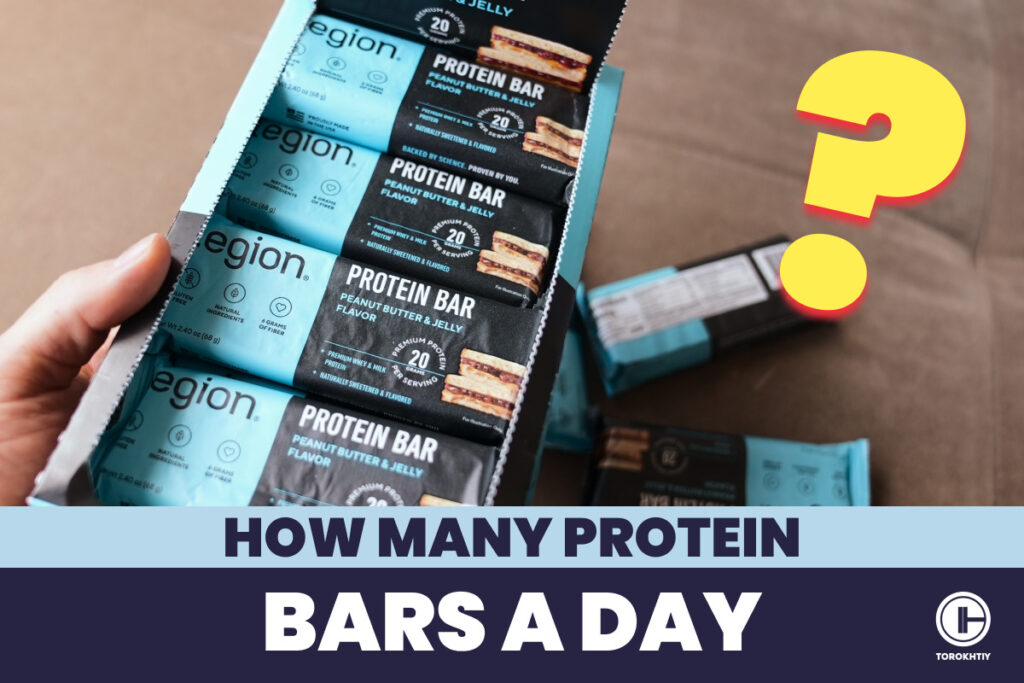
How Many Protein Bars a Day Can You Eat?
It’s difficult to give a one-size-fits-all answer to a question like “How many protein bars should you eat in a day?” This will depend largely on your needs and goals. However, for most people, one protein bar a day should be the limit. In some cases, however, multiple bars may be justified.
1. When Is One Bar Enough?
Protein bars ideally shouldn’t be the foundation of your diet. Most bars are relatively low in micronutrients, meaning they aren’t exactly a suitable replacement for a complete meal.
It’s also worth noting that many protein bars contain some unhealthy ingredients and artificial sweeteners which are not recommended to be consumed in large amounts.
As a result, they should be reserved for when you need an extra boost of protein while on the go, or when you’re too busy to cook a complete meal.
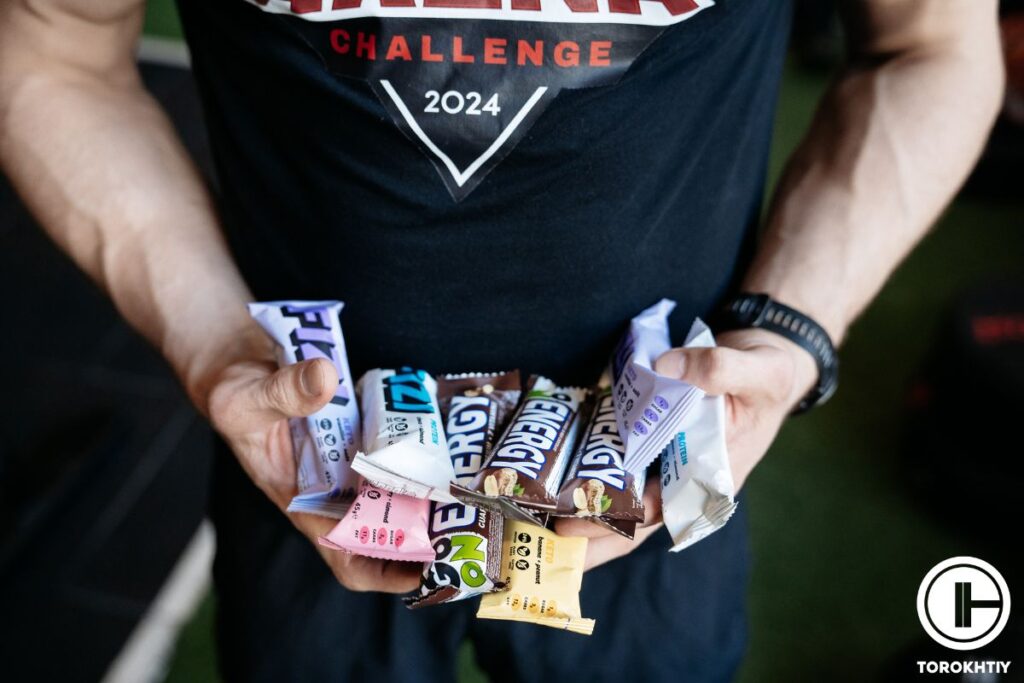
In this case, most people should be satisfied with one bar. This should be enough to tide you over until your next meal and help you hit your overall protein goals for the day. Depending on your nutrition goals, you can choose a bar that’s more or less calorically dense to better suit your needs.
2. When Can You Use More Than One Bar?
So, can you eat more than one protein bar a day? While we don’t recommend it as a habit, in some cases, eating several bars a day may be justified.
For example, if you’re out for an extended period, having a few bars over several hours can keep you full and help you hit your protein targets. Especially if you’re bulking, having 2+ bars may be an option to hit your daily calorie targets as well.
Protein bars may also be a better option instead of other easy alternatives like regular chocolate bars, fast food, and other highly processed options.
Keep in mind that if you’re doing this, you should be buying high-quality bars that are rich in protein and fiber, and low in sodium. Also, be sure to buy a bar that fits in line with your nutrition goals. We’ll be covering what makes a high-quality bar in more depth below.
Why You Shouldn’t Eat Too Many Protein Bars Everyday
At the end of the day, protein bars should not make up the basis of your diet. While they are convenient and delicious, we recommend prioritizing whole-food protein sources over things like protein bars.
By eating complete meals, you can ensure you’re getting adequate amounts of vitamins and minerals, which may not be present in whichever protein bar you’re eating. Protein bars may also be high in added sugar and sodium, which most people already get more than enough of.

So, eating multiple protein bars every day will likely limit your intake of high-quality whole foods, meaning they should mostly be saved for when you need them.
How to Choose a Protein Bar? – 4 Steps!
As mentioned above, you should be considering the calories, protein, fiber, and sodium content of whatever protein bar you’re looking at. This way, if you do ever need to eat multiple protein bars a day, you can be confident you have a quality option.
1. Consider Your Dietary Goal
First, consider whether you’re bulking, cutting, or maintaining weight. Protein bars typically range from 150-350 calories per serving, which can make a difference if you’re trying to hit a caloric surplus or maintain a caloric deficit.
Opt for a higher calorie bar when bulking, and a lower calorie option when cutting.
2. Choose a Bar with at least 15 g of Protein
Next, consider how much protein is in a protein bar. Regardless of the calorie content, we recommend shooting for 15g of protein minimum when choosing a protein bar.
If you’re looking to build muscle, you should be getting 0.7-1g of protein per pound of body weight, meaning 15g will be significant for most people. Also, higher protein ensures you’re getting less fat and carbs, which is ideal if you’re cutting.

It’s worth noting that plant-based protein bars often have lower protein content. So, 10g per bar is a suitable amount for a vegan protein bar.
3. Consider Fiber Per Serving
High-fiber diets are beneficial for reducing disease risk, improving overall health, and helping with satiation. However, most people do not get enough fiber in their diet, averaging around 15g per day. With the recommended amount being 25-35g, we recommend prioritizing fiber when choosing a protein bar.
While there’s no specific amount we recommend as a baseline, try finding a bar that contains at least several grams of fiber per serving.
4. Choose a Lower Sodium Protein Bar
Finally, consider how much sodium per serving each bar contains. Most people already get more than enough sodium in their diets, meaning adding in more from protein bars is unnecessary. Excessive sodium intake is linked to high blood pressure and cardiovascular disease, meaning it’s important to consider your daily intake.
Often, different flavors of the same bar will have varying sodium levels, so try and choose an option with as little sodium as possible.
Protein Bars by Legion
- Supplement Type: Protein Bars
- Best For: Building Muscles, Recovery
- Suitable for Vegans: No
- Added Sugar: 4g
- Price per Serving: ~$3.33
- Servings per Package: 12
- Recommended by Athletes: Gage Clark, Grant Tinsley
If you’re looking for a high-quality protein bar that meets all the criteria above, we recommend Legion.
Each bar contains 240-250 calories, making these more suitable for someone in a caloric surplus, although they could work for someone on a cut depending on the rest of your diet. Each bar contains 20g of protein and a solid 6-8g of fiber. They also only contain 150-170mg of sodium per serving.
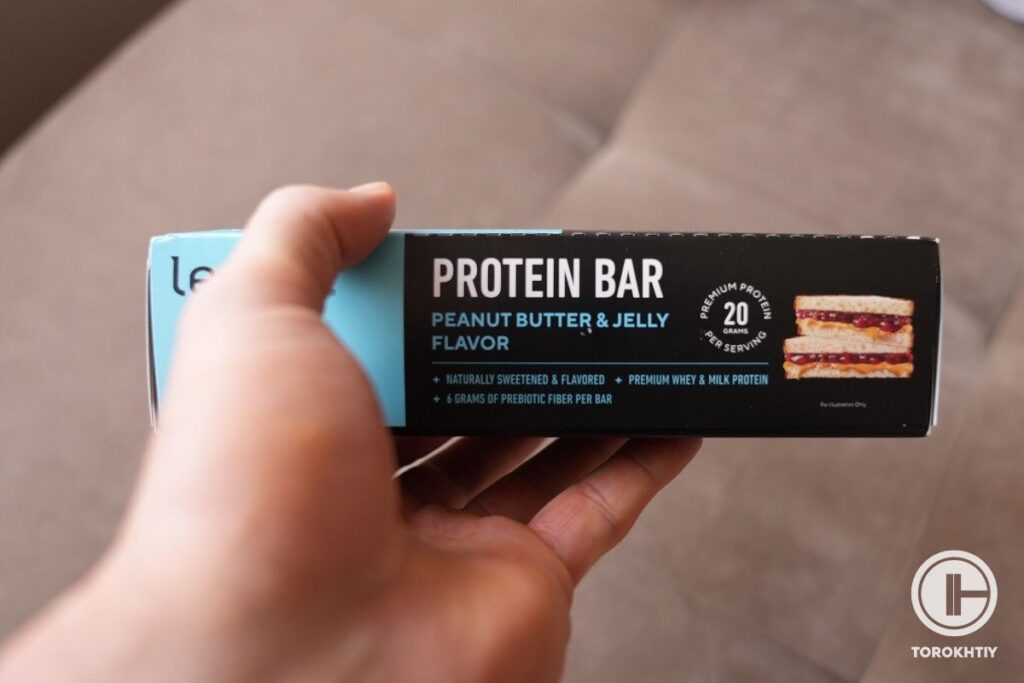
These are a high-quality protein bar free from any artificial ingredients. Just keep in mind they are fairly pricey at ~$3.33 per bar, which will add up over time if you’re planning on eating more than one a day!
Additional Protein Bar We Recommend – Transparent Labs Protein Bars
Transparent Labs Protein Bars
- Protein Source: Grass-Fed Whey Protein Isolate
- Flavors: Peanut Butter Chocolate Chip
- Vegan: No
- Protein per bar: 15g
- Fats ber bar: 16g
- Carbs per bar: 23g
- Fiber per bar: 3g
- Added Sugar: 5g
- Sugar Alcohol: No
- Calories per bar: 280
- Sodium per bar: 280mg
- Bars per Package: 12
- Bar Weight: 60g
- Price per bar: ~$3.33
- Recommended by Athletes: Hafthor Bjornsson, Paul Sklar, Sean Harris
Another solid protein bar is Transparent Labs’ Grass-Fed Protein+ Bars. While their macro breakdown is slightly different, they’re still a great overall choice.
THese bars contain 280 calories, making them ideal for someone who’s bulking. They have 15g of protein and 3g of fiber as well. They are also slightly higher in sodium than legion with 280mg per bar. So, while these don’t have as optimal a nutritional breakdown as Legion’s bars, they still meet our criteria for a great protein bar.
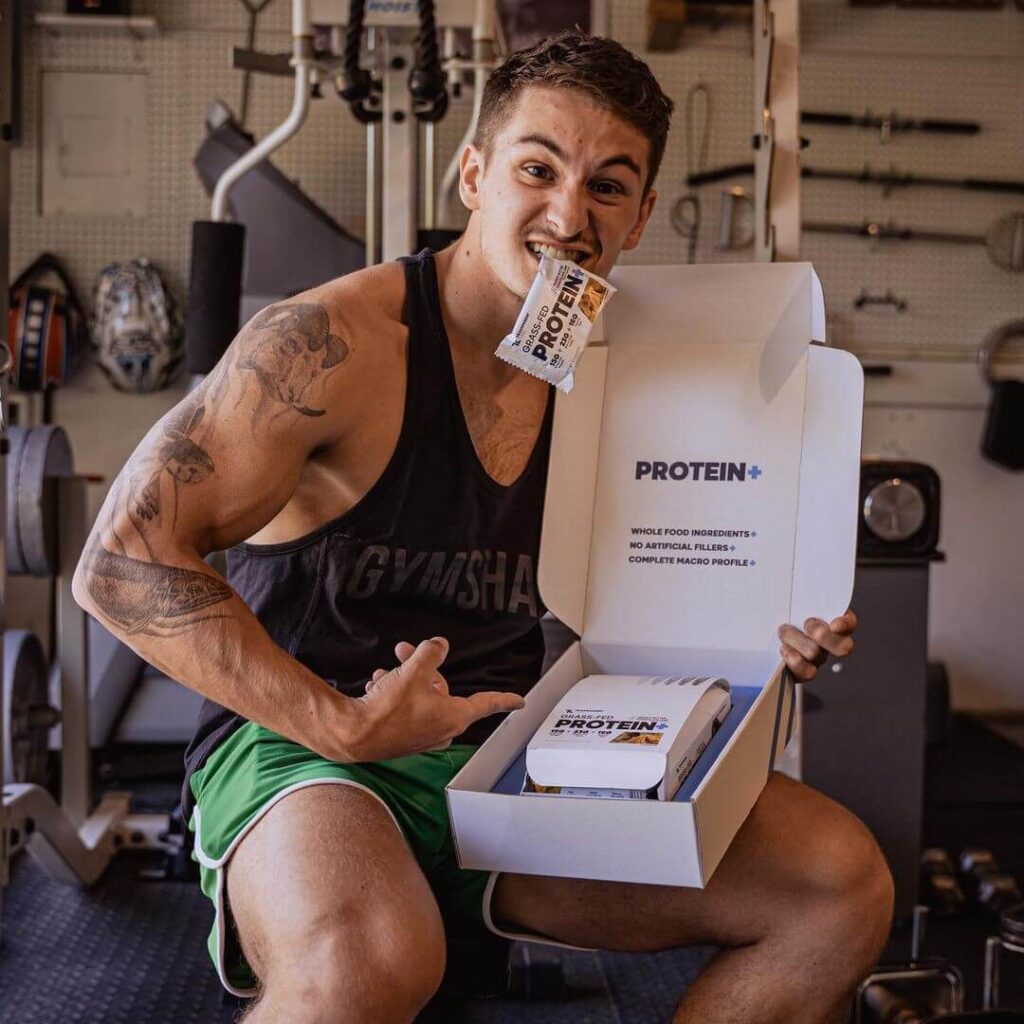
Similar to Legion, these don’t contain any artificial ingredients. They are also the same price at ~$3.33 per serving. Overall, you can’t go wrong with either of these choices, especially if you’re bulking!
FAQ
Is it OK to Eat 2 Protein Bars a Day?
As long as you’re eating a high-quality protein bar, eating two bars a day isn’t terrible. Some people may even consider eating 3 protein bars a day or more.
However, we recommend prioritizing whole foods in your diet instead and reserving protein bars for when you’re busy or on the go. So generally, we recommend limiting yourself to one bar a day to ensure you’re mostly eating whole foods instead.
Is it OK to Eat Protein Bars Every Day?
We recommend prioritizing complete meals and whole foods over easy snacks like protein bars. However, protein bars can be a convenient way to hit your protein targets and stay full when you’re busy or don’t have access to a full meal.
Can I Eat 2 Protein Bars Back to Back?
Especially if you’re bulking, eating 2 protein bars at once can be an easy way to get extra calories in. However, we always recommend prioritizing high-quality whole foods over things like protein bars.
Conclusion
Protein bars are a convenient and easy way to hit your protein targets when you’re on the go. However, you probably shouldn’t rely on them as a main protein source, so we don’t recommend eating them multiple times a day.
If you’re looking to incorporate protein bars in your diet make sure they’re high-quality. Our top picks for a great protein bar are from Legion and Transparent Labs.
How often do you eat protein bars? Do you have a favorite brand? Let us know your thoughts in the comments below!
Also read:
- Legion Protein Bars Review
- When Should You Eat Protein Bars
- Do Protein Bars Make You Gain Weight
- Is It Bad to Eat Protein Bars Everyday
- Are Protein Bars Good for Breakfast
- Do Protein Bars Give You Gas
References:
- The Nutrition Source, “Vitamins and Minerals”, Harvard T.H. Chan School of Public Health, https://www.hsph.harvard.edu/nutritionsource/vitamins/ (Accessed May 1, 2024)
- The Nutrition Source, “Added Sugar”, Harvard T.H. Chan School of Public Health, https://www.hsph.harvard.edu/nutritionsource/carbohydrates/added-sugar-in-the-diet/ (Accessed May 1, 2024)
- The Nutrition Source, “Salt and Sodium”, Harvard T.H. Chan School of Public Health, https://www.hsph.harvard.edu/nutritionsource/salt-and-sodium/ (Accessed May 1, 2024)
- Everson A. Nunes, et. al, “Systematic review and meta-analysis of protein intake to support muscle mass and function in healthy adults,” Journal of Cachexia, Sarcopenia and Muscle, 13, 795–810, (2022)
- The Nutrition Source, “Fiber”, Harvard T.H. Chan School of Public Health, https://www.hsph.harvard.edu/nutritionsource/carbohydrates/fiber/ (Accessed May 1, 2024)
- Photos made by Torokhtiy Media Team.
Why Trust Us?
With over 20 years in Olympic weightlifting, strength training, nutrition coaching, and general fitness our team does its best to provide the audience with ultimate support and meet the needs and requirements of advanced athletes and professional lifters, as well as people who strive to open new opportunities and develop their physical capabilities with us.
By trusting the recommendations of our certified experts in coaching, nutrition, and sports training programming, as well as scientific consultants, and physiotherapists, we provide you with thorough, well-considered, and scientifically proven content. All the information given in the articles concerning workout programming, separate exercises, and athletic performance, in general, is based on verified data.
The product testing process is described in more detail here.
Camila has worked as a Nutritionist for 7 years. In addition to being a nutritionist, she is an amateur weightlifting athlete for 2 years. Camila has experience at Flamengo’s football base and in a food supplement company and currently provides services at a clinic. At the moment she is coursing a postgraduate study in Sports Nutrition.
Reviewed by: Jacek Szymanowski
Certified Nutritionist,
M.Sc.Eng. Biotechnology
Performance architect,
Strength and Conditioning Specialist
With over 30 years of fighting experience, specialization in nutrition coaching for athletes, and expertise in metabolic health and dietary strategies, Jacek offers a comprehensive approach to optimizing your performance and well-being. Backed by a Master of Science degree in Biotechnology, Jacek remains at the forefront of scientific advancements, ensuring that his coaching is always evidence-based and up-to-date.




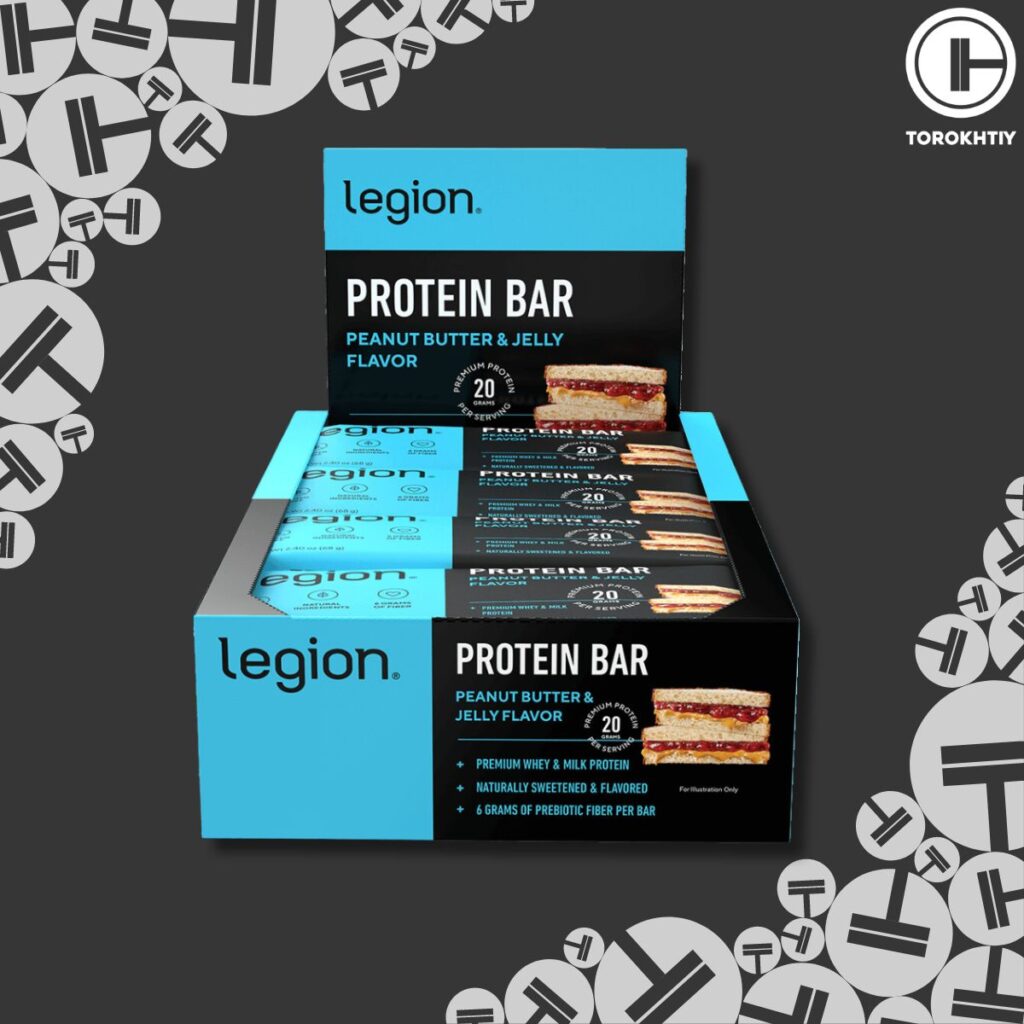
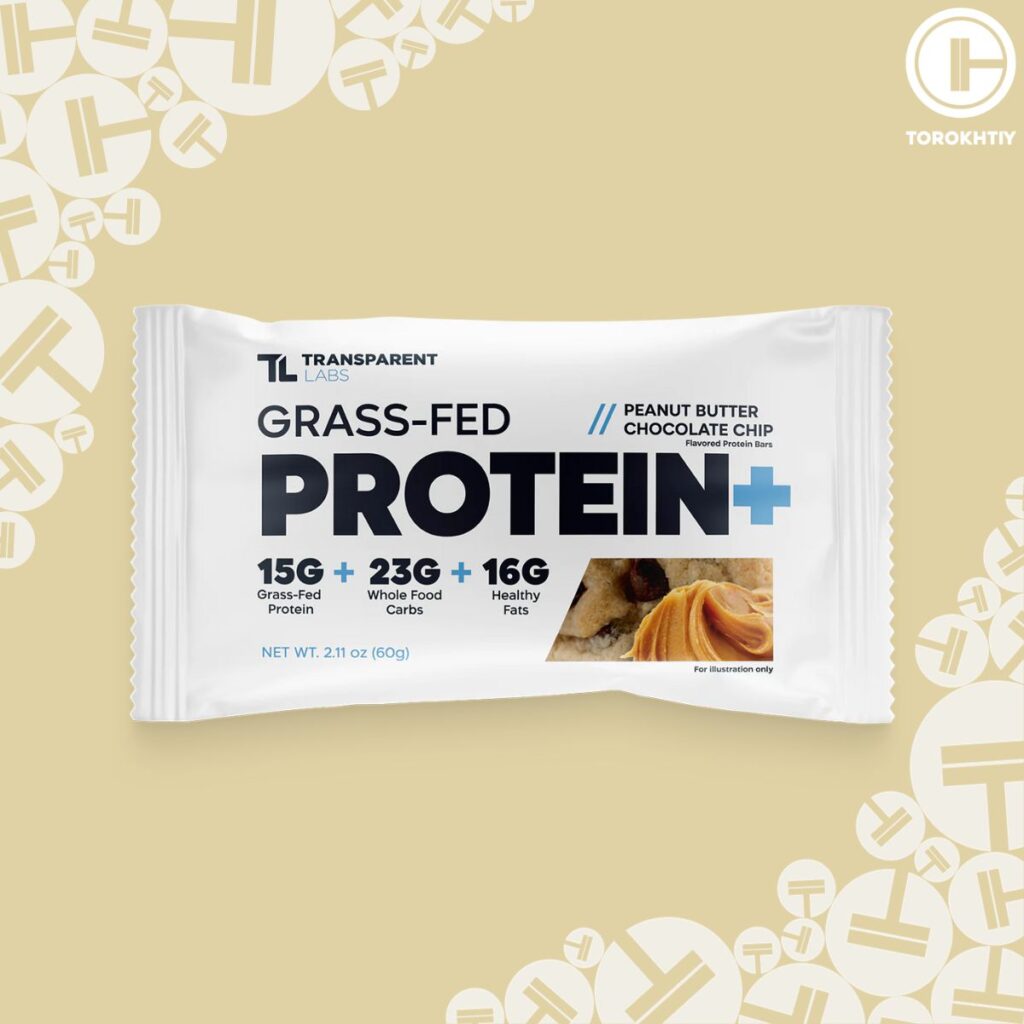
Still have questions after reading our article? Unlock your full potential by engaging with our experts and community! Don’t hesitate — leave a comment below and Camila Parente Santos will provide a personalized answer and insights to help you reach your goals.